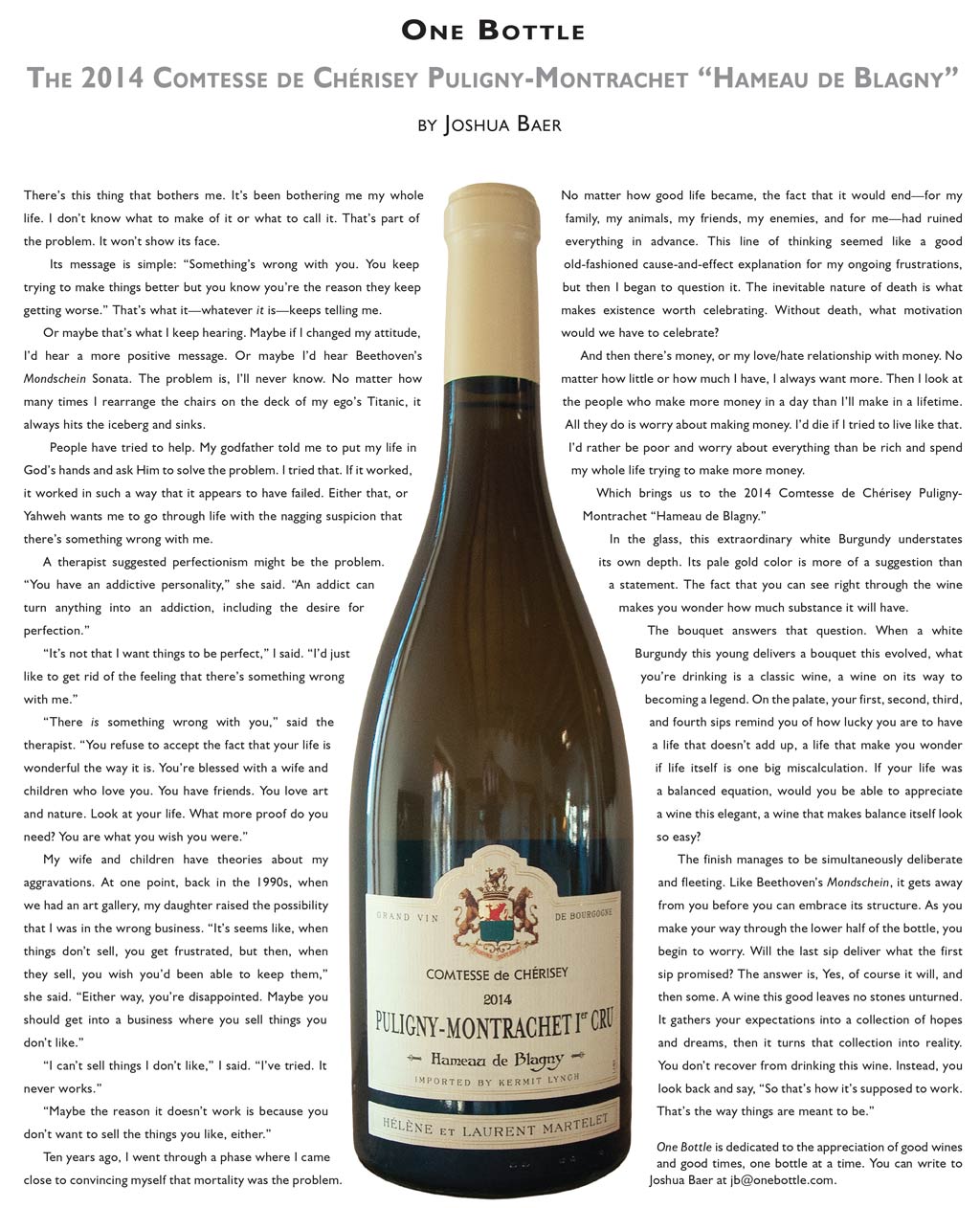2014 Comtesse de Chérisey Puligny-Montrachet “Hameau de Blagny”
There’s this thing that bothers me. It’s been bothering me my whole life. I don’t know what to make of it or what to call it. That’s part of the problem. It won’t show its face.
Its message is simple: “Something’s wrong with you. You keep trying to make things better but you know you’re the reason they keep getting worse.” That’s what it—whatever it is—keeps telling me.
Or maybe that’s what I keep hearing. Maybe if I changed my attitude, I’d hear a more positive message. Or maybe I’d hear Beethoven’s Mondschein Sonata. The problem is, I’ll never know. No matter how many times I rearrange the chairs on the deck of my ego’s Titanic, it always hits the iceberg and sinks.
People have tried to help. My godfather told me to put my life in God’s hands and ask Him to solve the problem. I tried that. If it worked, it worked in such a way that it appears to have failed. Either that, or Yahweh wants me to go through life with the nagging suspicion that there’s something wrong with me.
A therapist suggested perfectionism might be the problem. “You have an addictive personality,” she said. “An addict can turn anything into an addiction, including the desire for perfection.”
“It’s not that I want things to be perfect,” I said. “I’d just like to get rid of the feeling that there’s something wrong with me.”
“There is something wrong with you,” said the therapist. “You refuse to accept the fact that your life is wonderful the way it is. You’re blessed with a wife and children who love you. You have friends. You love art and nature. Look at your life. What more proof do you need? You are what you wish you were.”
My wife and children have theories about my aggravations. At one point, back in the 1990s, when we had an art gallery, my daughter raised the possibility that I was in the wrong business. “It’s seems like, when things don’t sell, you get frustrated, but then, when they sell, you wish you’d been able to keep them,” she said. “Either way, you’re disappointed. Maybe you should get into a business where you sell things you don’t like.”
“I can’t sell things I don’t like,” I said. “I’ve tried. It never works.”
“Maybe the reason it doesn’t work is because you don’t want to sell the things you like, either.”
Ten years ago, I went through a phase where I came close to convincing myself that mortality was the problem. No matter how good life became, the fact that it would end—for my family, my animals, my friends, my enemies, and for me—had ruined everything in advance. This line of thinking seemed like a good old-fashioned cause-and-effect explanation for my ongoing frustrations, but then I began to question it. The inevitable nature of death is what makes existence worth celebrating. Without death, what motivation would we have to celebrate?
And then there’s money, or my love/hate relationship with money. No matter how little or how much I have, I always want more. Then I look at the people who make more money in a day than I’ll make in a lifetime. All they do is worry about making money. I’d die if I tried to live like that. I’d rather be poor and worry about everything than be rich and spend my whole life trying to make more money.
Which brings us to the 2014 Comtesse de Chérisey Puligny-Montrachet “Hameau de Blagny.”
In the glass, this extraordinary white Burgundy understates its own depth. Its pale gold color is more of a suggestion than a statement. The fact that you can see right through the wine makes you wonder how much substance it will have.
The bouquet answers that question. When a white Burgundy this young delivers a bouquet this evolved, what you’re drinking is a classic wine, a wine on its way to becoming a legend. On the palate, your first, second, third, and fourth sips remind you of how lucky you are to have a life that doesn’t add up, a life that make you wonder if life itself is one big miscalculation. If your life was a balanced equation, would you be able to appreciate a wine this elegant, a wine that makes balance itself look so easy?
The finish manages to be simultaneously deliberate and fleeting. Like Beethoven’s Mondschein, it gets away from you before you can embrace its structure. As you make your way through the lower half of the bottle, you begin to worry. Will the last sip deliver what the first sip promised? The answer is, Yes, of course it will, and then some. A wine this good leaves no stones unturned. It gathers your expectations into a collection of hopes and dreams, then it turns that collection into reality. You don’t recover from drinking this wine. Instead, you look back and say, “So that’s how it’s supposed to work. That’s the way things are meant to be.”
One Bottle is dedicated to the appreciation of good wines and good times, one bottle at a time. You can write to Joshua Baer at jb@onebottle.com.
